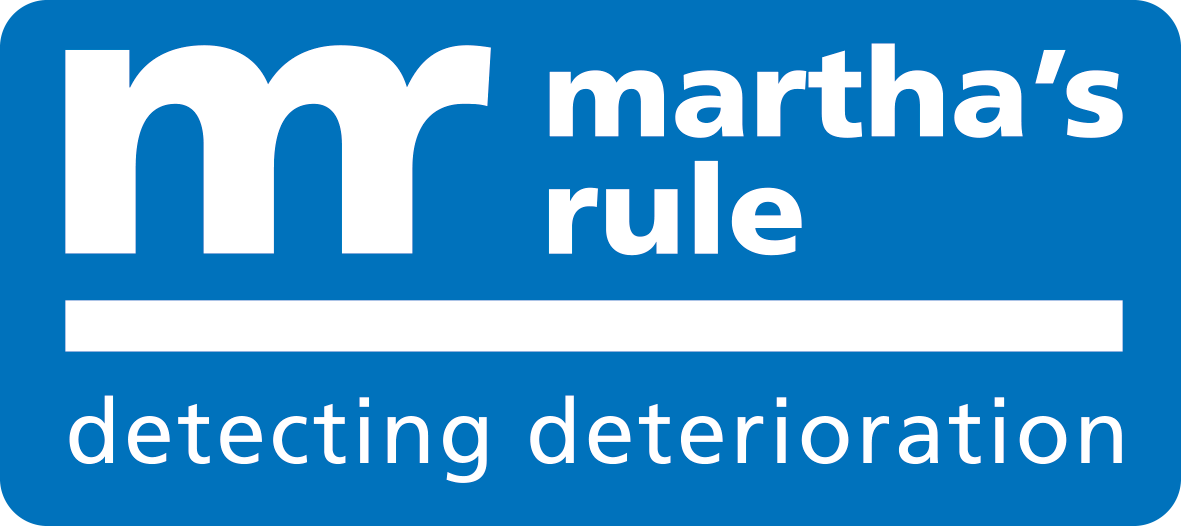Preventing harm from deterioration is a key aim of the NHS Patient Safety Strategy
Martha’s Rule helps support the early detection of deterioration by ensuring that the concerns of patients, families, carers, and staff are heard and acted upon.
Managing deterioration looks at the whole pathway of care, using the PIER – Prevention, Identification, Escalation, and Response approach.
Together, these initiatives aim to make the management of acute physical deterioration safer and more effective, through better system co-ordination and reliable pathways of care by 2027.

Martha’s Rule
Health Innovation West of England has been selected by NHS England as a key delivery partner for implementing Martha’s Rule across our region, working closely with colleagues from all three Integrated Care Systems.
At the heart of Martha’s Rule is the right for patients, families and carers to request a rapid review if they are worried that a condition is getting worse and feel their concerns are not being addressed.
Martha’s Rule is named after 13-year-old Martha Mills, who died in 2021 after developing sepsis in hospital. Martha had been admitted with a pancreatic injury following a cycling accident. Despite her family’s concerns about her deteriorating condition, these were not acted upon. In 2023, a coroner ruled that Martha would probably have survived if she had been moved to intensive care earlier.
In response to this and other cases, the Secretary of State for Health and Social Care and NHS England committed to introducing Martha’s Rule, ensuring that the concerns of patients, and those who know them best are listened to and acted upon.
This programme builds on learning from the National Worry and Concern Improvement Collaborative, which began in 2023 across seven pilot sites.
Key Components of Martha’s Rule:
- Patients will be asked, at least daily, about how they are feeling, and if they are getting better or worse, and this information will be acted on in a structured way.
- All staff will be able, at any time, to ask for a review from a different team if they are concerned that a patient is deteriorating, and they are not being responded to.
- This escalation route will also always be available to patients themselves, their families and carers and advertised across the hospital.
Martha’s mother, Merope Mills, has been a strong advocate for these changes. You can hear her speak on BBC Radio 4’s Woman’s Hour and learn Merope’s thoughts on Martha’s Rule.
In May 2024, Martha’s Rule was introduced at 143 pilot sites within NHS acute trusts across England.
Between September 2024 and June 2025, 4,906 calls were made to Martha’s Rule helplines to escalate concerns about care, which resulted in 241 potentially life-saving interventions. Building on this success, the NHS has expanded the service to a further 67 sites, meaning all 210 acute inpatient hospitals providing adult and/or paediatric acute inpatient care in England now provide access to Martha’s Rule.
Phase 2 also includes testing the approach in additional settings, including maternity and neonatal units, emergency departments, community hospitals and mental health services.
Resources
- NHS England statistics for the Martha’s Rule Programme
- Martha’s Rule at Bristol Royal Hospital for Children
- Martha’s Rule at North Bristol NHS Trust
- Martha’s Rule at Gloucestershire Hospitals
- Martha’s Rule at Royal United Hospital, Bath
- Martha’s Rule at Great Western Hospital, Swindon
- “Why Martha’s Rule matters” – Health Innovation West of England blog
For more information, please contact Senior Project Manager, Siobhan Lanigan, on siobhan.lanigan@nhs.net.



